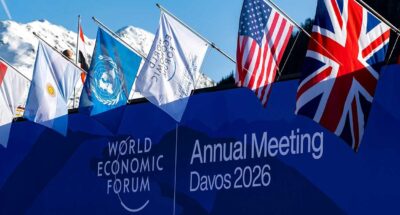
Holcim’s Ram Muthu: Can circular construction scale?
Holcim’s Ram Muthu on circularity, EU regulation, and what it really takes to decarbonize cement at industrial scale....

by Arturo Bris Published September 24, 2025 in Geopolitics • 8 min read • 
The Russian invasion of Ukraine in February 2022 not only reshaped European geopolitics but also generated a seismic shock to the climate policy landscape. As European nations scrambled to ensure energy security following the severing of Russian gas supplies, what was once a consensual commitment to net-zero targets became a fierce political battleground. For business leaders driving sustainability strategies, this polarization represents the messy reality of democratic debate and a strategic challenge requiring a sophisticated approach.
The stakes could not be higher. Net-zero policies that were previously considered technocratic, scientific, and environmental necessities are wielded as political weapons. Governments defend their climate commitments with increasingly urgent data-driven arguments, while the UK’s populist Reform party derides renewable investments as “net stupid zero“. This politicization, while creating uncertainty, reflects democracy at its best with voters actively choosing between competing visions of economic development, social priorities, and environmental responsibility – today’s cost versus tomorrow’s benefit.
The climate debate has crystallized into distinct camps, each deploying powerful arguments that resonate with different voter constituencies. This isn’t merely political theater; it represents an aspect of democratic engagement with one of the most complex policy challenges of our time.
European lawmakers who accept the scientific consensus on climate change typically pursue two complementary approaches: mitigation (reducing greenhouse gas emissions through renewable energy transitions) and adaptation (building resilience against climate impacts). These politicians frame climate action as an environmental imperative and an economic opportunity.
Their arguments are often data-rich and appeal to the intellect and center on job creation in emerging green industries, technological leadership in renewables, and energy security benefits. They emphasize the risks of inaction: extreme weather events, infrastructure damage, and economic disruption from climate impacts. For them, net zero isn’t just about environmental protection; it’s about economic competitiveness and energy independence.
This coalition’s messaging has evolved significantly since the crisis in Ukraine. Where climate advocates once relied primarily on environmental urgency, they now lead with economic arguments about industrial policy, supply chain resilience, and strategic autonomy. Key figures like European Commission President Ursula von der Leyen have reframed the Green Deal as Europe’s growth strategy, emphasizing the belief (possibly unfounded) that the continent that leads in clean technology will dominate the next economic era.
The fundamental political divide in Europe around net zero is not simply between center-left and right-wing parties, but between populist movements on both extremes and more pragmatic, centrist political views. While far-right populists reject climate action outright, far-left populist parties create their own obstacles through ideological rigidity – for instance, categorically opposing nuclear energy despite its role in decarbonization and energy security. Both extremes share a tendency toward absolutist positions that can undermine practical climate solutions.
This populist polarization from both flanks leaves centrist politicians – whether center-left or center-right – struggling to build the pragmatic coalitions necessary for effective climate policy. The result is a political landscape where evidence-based approaches to net zero face opposition not just from climate skeptics, but from ideological purists who prioritize political positioning over practical progress.
Far right populist parties have gained democratic legitimacy by weaponizing genuine voter anxieties about the pace and cost of green transitions, in addition to rising inflation fueled by soaring energy bills. Climate has become a political football used by Giorgia Meloni (Italy), Marine Le Pen (France), Alice Weidel (Germany), Nigel Farage (UK) and Donald Trump (US), and coopted by far right populist parties in a strategy to gain power, even in the absence of offering scientifically sound alternative solutions to the climate crisis. Their tactics may be aggressive, but their electoral and polling success shows this rough and tumble approach plays to their base’s concerns about short-term economic disruption and social equity.
In France, the National Rally has skillfully exploited farmer protests against green measures, calling for the overthrow of combustion engine bans. Germany’s Alternative für Deutschland (AfD) deploys inflammatory rhetoric about “climate Soviets” and “eco-dictatorship”. They perceive climate change and climate policies as a project of a cosmopolitan elite that is detached from the everyday life of the common man.
Reform UK channels working-class concerns about energy costs and jobs using the now-familiar “net stupid zero” refrain to undermine the center-left Labour government’s climate and energy strategy. One of the party’s first moves after it secured a majority on a county (regional) council was to redirect spending from climate abatement to flood adaptation.
Across Europe, climate skepticism takes different forms: Hungary prioritizes energy sovereignty while Poland emphasizes economic competitiveness, but their common focus on energy security, affordability, and efficiency reveals that similar material concerns can be channeled through different ideological narratives to suit national political contexts.
These politicians employ “discourses of climate delay” (detailed at the end of this article) – sophisticated strategies that redirect responsibility, emphasize the downsides of renewables, and suggest that transformative change is impossible. While frustrating to climate advocates, they represent legitimate political opposition and use net zero as a political, social, and economic wedge issue as they sow fear, uncertainty, and doubt about the validity of the transition to a low-carbon economy.

The invasion of Ukraine created a perfect storm for the politicization of climate policy. Energy security concerns suddenly trumped environmental considerations, giving climate skeptics powerful new arguments for continuing to buy and invest in fossil fuels from sources other than Russia. “Why should we rely on unreliable renewables when our energy security is at stake?” became a common refrain.
However, the crisis has also strengthened the case for renewable energy independence. Politicians driving the charge to net zero began framing solar panels and wind turbines not as environmental luxuries, but as national security necessities. This duality – energy transition as both vulnerability and strength – has become central to the debate.
The transatlantic dimension adds further complexity. Trump’s return to the presidency brings renewed pressure on climate policies in the US and beyond, with his administration attacking renewable energy projects. His recent comments to reporters at his golf club in Scotland – “Stop the windmills! You are ruining your countries, ruining your beautiful fields and valleys, and killing your birds!” – exemplify how populist rhetoric transcends borders, emboldening European climate skeptics while creating additional uncertainty for multinational businesses navigating divergent and potentially unstable regulatory environments.
For business leaders, this political battlefield presents existential challenges and unexpected opportunities. The key insight is counterintuitive: rather than lamenting the deepening politicization of climate policy, successful leaders recognize this democratic contest as natural and potentially beneficial – forcing policies to earn broader social legitimacy while creating space for business leadership.
The challenge isn’t to transcend politics but to navigate it skillfully. Companies that master this art can gain competitive advantages, build more durable stakeholder coalitions, and position themselves as solution-providers regardless of which political vision or, more likely, mix of visions ultimately prevail.
Reposition net zero from environmental activism to business pragmatism. Instead of leading with carbon reduction targets, highlight energy independence, supply chain resilience, and operational efficiency gains. Major on positioning your company as futureproofing against energy price volatility rather than saving the planet.
For conservative audiences, emphasize innovation, competitiveness, and energy independence. For progressive audiences, maintain focus on environmental benefits while emphasizing the just transition. Nothing transcends political divisions like local economic benefits – highlight investments in terms of regional job creation, skills, and community development.
Environmental strategies are part of a company’s risk management. Connect net-zero strategies with building resilience against climate impacts. For companies offering infrastructure or systems that improve resilience (e.g., smart grids, energy storage, etc.), this is a direct value proposition.
Support policies that ensure the costs and benefits of climate action are shared fairly. This can help address concerns about the disproportionate impact on low-income households and align with the social equity focus of left-leaning parties.
Develop communication strategies that avoid partisan climate language. Focus on “energy solutions” and “innovation investments” rather than “climate action”. Form partnerships spanning traditional political boundaries with trade associations, chambers of commerce, and labor unions to provide political cover and amplify influence.
Despite developments like HSBC’s withdrawal from the Net Zero Banking Alliance, businesses should continue providing transparent, data-driven evidence of the economic benefits of climate action. If there is no evidence, then drop it. Quantify the business case with concrete metrics that speak to financial performance, reusing messages traditionally employed for shareholders and creditors.
The political battle over net zero in Europe is democracy in action – raw, contentious, but ultimately legitimate. The democratization of climate policy and putting the Paris Agreement through the political “wringer” strengthens the legitimacy of whatever policies – or mix of policies – emerge from that crucible.
The most successful companies will thrive despite this democratic turbulence rather than waiting for political consensus, which likely won’t materialize. Leaders will recognize this political contest is producing more resilient and socially legitimate policies than a technocratic consensus ever could, and they will build strategies that create value, regardless of which coalition has the upper hand at any one time.
The CEOs and their teams who master the alignment between energy independence and climate action – speaking to populist concerns about security while delivering on progressive sustainability goals – will emerge as architects of a more resilient democratic approach to the energy transition. The political weapons may be sharp, but this is how democracies work through their most challenging problems, creating unprecedented opportunities in the creative tension between democratic competition and economic necessity.
To make progress on projects aimed at abating climate change or adapting to its effects, business leaders must counter sophisticated, primarily populist, arguments against climate action. Research identifies four main “climate delay” discourses:
Counter by emphasizing your company’s leadership role and competitive advantages from early action.
Respond by demonstrating the business case for current investments while supporting continued innovation.
Address concerns directly with comprehensive cost-benefit analyses and transition support programs.
Counter with concrete examples of successful implementations and achievable goals.

Professor of Finance at IMD
Arturo Bris is Douglas Geertz IMEDE 1988 Professor in Geopolitics and Business and Professor of Finance at IMD. Since January 2014, he has led the world-renowned IMD World Competitiveness Center. At IMD, Bris directs the Boards and Risks program and Blockchain and the Future of Finance program. He also previously directed the flagship Advanced Strategic Management program between 2009 and 2013.

January 27, 2026 • by Julia Binder in Sustainability
Holcim’s Ram Muthu on circularity, EU regulation, and what it really takes to decarbonize cement at industrial scale....

January 23, 2026 • by David Bach, Julia Binder in Sustainability
Live from Davos: IMD’s Julia Binder and David Bach cut through the headlines on geopolitics, AI, energy – and competing visions for the international order....

January 19, 2026 • by Sara Ratti, Frederic Barge, Florian Hoos , Florence Hugard, Danielle Landesz Campen, Karl Schmedders in Sustainability
First-year CSRD and ESRS disclosures boost transparency in energy and utilities, but early evidence shows compliance is outweighing strategic insight....

January 13, 2026 • by Julia Binder, Knut Haanaes in Sustainability
IMD’s Inside the Transition hosts Pictet CSO Marie-Laure Schaufelberger to explore how finance drives the energy transition and ESG strategies....
Explore first person business intelligence from top minds curated for a global executive audience